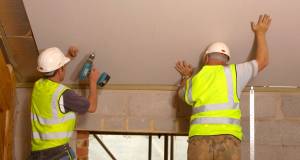Dead heat

As energy prices continue to rise, the Irish construction industry is moving into uncharted territory, where all elements that affect energy performance—from orientation, to building design, to specification, to standard of workmanship—are increasingly recognised as key concerns. However, the shift to genuinely energy efficient building is pitted against an environment where the government is reluctant to put a buoyant industry focused on maximum output rather than standards under the microscope, as Construct Ireland’s John Corless reveals.
Government inaction is leaving thousands of house buyers throughout the Republic of Ireland exposed to unnecessary risks due to lack of proper inspection infrastructure. As a result, conscientious trades people are being forced out of the market by the insatiable appetite of unscrupulous builders for cost cutting practices on site. The Building Regulations state that we should use suitable materials and processes, but the onus is firmly placed on builders to comply rather than on the state to police.
“We build very badly in Ireland,” says architect and TV personality Duncan Stewart. “We use outdated and inefficient technologies and our standard of workmanship is very poor. We should be looking at best practice in other countries and implementing that here. Because demand is outstripping supply in this country, builders are getting away with bad work standards both in terms of materials used and quality of work delivered. There’s no proper independent inspections of work either,” he adds. And he’s right.
While no builder will publicise in his glossy brochures that he does shoddy work or that the show house is thermally inefficient and will be costly to maintain, the unfortunate reality is that many do and are, and in a lot of cases the Government here doesn’t seem to care. It is left to the industry itself to attempt to raise overall standards.
 Down District Council's building control team receive a British Government award for achieving high standards. The team stress the importance of their enforcement role, contrasting starkly with the lack of an equivalent service south of the border
Down District Council's building control team receive a British Government award for achieving high standards. The team stress the importance of their enforcement role, contrasting starkly with the lack of an equivalent service south of the border
If a property is under 125m2, the buyer could qualify for Stamp Duty Exemption. As with everything of course nowadays, terms and conditions apply. But significant numbers do qualify and most new homes – certainly the vast majority of those in the housing estates in the towns and cities throughout the country – are below the 125m2 threshold. Cynically, these are the only houses inspected by building control officers from the Department of Environment, Heritage & Local Government. The reason for this inspection is allegedly two-fold but there is evidence to confirm that there is really only one purpose for the inspection. The primary function of the inspection is to prevent properties that are slightly over the 125 m2 limit from slipping through the net and thereby ensure stamp duty is collected in every case possible. While the inspector is there, he or she will carry out an examination of the building to ensure that it complies with the planning permission issued and with the Building Regulations. If everything is in order a Floor Area Compliance Certificate is issued to the builder who can then sell the property on. If the property is slightly over the floor area limits or if it is evident that it doesn’t comply with the regulations, no certificate is issued. Most people would have no problem with that concept.
But how thorough can the inspection really be if the house is completed or nearly completed when the inspector calls? Can they examine the foundations for example? Can they examine elements of the work which are covered up? This examination by its very nature can only be of the works visible at the time of the inspection and even then, if a row of similar houses is built, can we be certain that each house was actually examined? It would seem that the inspection process concentrates on some elements of the work more than others—in particular the visible elements rather than that which was covered-up when the visit took place. Houses over 125 m2 are not checked by government officials. One can only presume that the reason for this is that these properties don’t require a certificate to say that they are within stamp duty size limits, which is overwhelming evidence that the sole motivation for the inspection was to prevent otherwise non-qualifying properties from slipping through the stamp duty exemption net. The motivation for the inspection is not consumer-driven; it is purely a mechanism to raise more revenue from the industry by the State.
Any protection afforded the buyer of properties outside the limit–namely the bigger houses—rests with their solicitor. If the solicitor is competent, they will insist on the production of a report confirming compliance with planning permission and Building Regulations, by an architect, surveyor or engineer. But this report is discretionary – in that it is a guideline issued by the incorporated Law Society rather than a statutory requirement. Mortgage companies will also look for a certificate of valuation – usually supplied by an auctioneer. This is merely the opinion of one individual on one day, as to the value of a property. And there are other problems too. Anyone can call him or herself an architect or surveyor. The Building Control Bill 2005, introduced by Minister Roche on December 22 last, seeks to rectify this anomaly by defining what these titles mean and by the introduction of a registration process. While this is going through the parliamentary process, the consumer remains dependant on Law Society guidelines, to ensure that the person claiming to be competent to issue the certificates of compliance, is in some way qualified or has professional indemnity insurance.
Questions have been asked of the true independence of professionals engaged in the construction industry when it comes down to certification. It could be argued that these professionals could be influenced by offers of work from the builder/developer on an ongoing basis and that the inspections might not be as thorough or a tough as they should be. In reality however this seems unlikely for the most part. Professional engineers, architects and surveyors are usually just that: professional. But the Government, if it had the will and was truly on the side of the consumer, could remove any doubt whatsoever by introducing a system of building control like that which exists in Northern Ireland. There, government-employed surveyors inspect all house building and some renovations, at several stages during the construction process, which on a typical project runs as follows: The initial involvement is at the planning stage when officers from the local Building Control office carry out what is called Plan Assessment. Next is a check of the ground conditions before the concrete is poured. The surveyors go on to check the hard-core fill. In buildings where a radon membrane is required they check that it is suitable and installed correctly. The sub-structure – the blockwork and brickwork – is checked including the cavities and the ties, as well as damp proof courses. Drainage is examined before backfilling. Floor joists are examined to see that they sized and fixed properly. Stairs, ventilation, insulation and roof construction are also checked. When the building is finished (and usually before occupation,) a Completion Certificate is issued if everything is in order. Why is that not done in the South? One source inside the Department of Environment indicated that the resourcing requirements of such a process would be too much given the construction boom. But surely this is not an adequate excuse. Every other sector of the construction industry has had to deal with the boom, including planners – another arm of the government.
 "Because demand is outstripping supply in this country, builders are getting away with bad work standards both in terms of materials used and quality of work" - Duncan Stewart
"Because demand is outstripping supply in this country, builders are getting away with bad work standards both in terms of materials used and quality of work" - Duncan Stewart
Given this landscape of apathy it’s little wonder that builders are relying on the cheapest product possible to enhance their profits. House builders stubbornly continue to install traditional and inefficient oil boilers, for example, ignoring the more efficient condensing boilers, hypocritically proclaiming that they are trying to keep the cost down for the consumer. In reality their motivation is usually profit margin protection.
A good example of the specialist trades tying to do something to raise quality and indeed safety standards is the evolution of the Irish Plumbing & Heating Association. Here two conscientious trades people got together in an attempt to raise public and indeed industry awareness of the importance of doing the job right. Galway man, Michael Meehan says that shocking plumbing and heating practices are to be found in Irish construction sites.
“We want the trade to be standardised across the board and we’d like to see regulations and standards enforced,” Michael says. “As it stands anybody can walk into a shop and buy a bag of fittings and a roll of pipe and call himself a plumber and nobody can stop him. Experienced plumbers, who have established professional businesses—many with twenty or thirty years experience on top of a recognised apprenticeship are getting priced out of the market.”
 "Poor performing houses will have a much lower value than those with the better energy ratings. People aren't fools and if two similar houses appear on the market the one with the best energy rating will sell first" - Peter Keavney
"Poor performing houses will have a much lower value than those with the better energy ratings. People aren't fools and if two similar houses appear on the market the one with the best energy rating will sell first" - Peter Keavney
Michael says that problems frequently arise when inexperienced or unprofessional plumbing contractors are engaged. He points to problems and consequences. “Many houses now are expensively fitted out. People are spending more and more money on furnishings and finishes. If you take a situation where an unqualified and incapable plumber works in that house and say, a pipe leaks because it wasn’t properly tested or the wrong materials were used, the fit out can be destroyed. Wooden flooring, carpets, expensive wallpapering or decorative ceilings can all be ruined. Then there’s the nuisance associated with the clean-up – and of the remedial works. Okay, insurance may very well pick up the bill, but most people would prefer it never happened. The whole sorry business gives the trade a bad name.”
“People are turning to other sources of heat than oil and gas. Wood and other solid fuels have become popular again. The price of oil and gas is worrying a lot of people,” he says. “If back boilers are not properly installed they can be a bomb waiting to explode. Inexperienced plumbers are installing these with no open vent, sometimes with an incorrect cold feed. Many are simply not properly installed. We are often called out when there is a problem and these other guys either can’t be found or can’t fix it. The heating system might be banging or the boiler isn’t heating the system properly. A common problem is where a solid fuel boiler has been fitted and there might be an oil or gas boiler in the house already, and this so called plumber has the two interconnected and pressurised from the mains. It’s criminal,” he says.
Michael Meehan and Donegal man Mickey McLoughlin have established the Irish Plumbing & Heating Association, and they are now calling on plumbers to join the grouping in an effort to establish a nationwide database of experienced and capable contractors and to raise standards everywhere. “Another need for the Association is that technology is moving on but the guys aren’t moving on with it,” Michael adds. “There’s installation practices and standards that should be adhered to but some people aren’t doing that. Boilers need to be sized properly, houses need to be zoned.” Michael goes on to say that the use of plastic pipe is commonplace now in the construction industry. There are regulations governing its use and these aren’t always adhered to. “Plastic pipe is frequently used for primary circuits – the pipe runs to and from the boiler – and the regulations state that it should be terminated one metre from the boiler and the remainder run in copper. Some of these so-called plumbers are using it all the way.” Michael is also concerned that plumbers are installing heat pump systems without proper knowledge of what’s involved.
“While this might not have the inherent dangers of other systems, it remains a highly specialised operation and only properly trained and experienced people should be installing it. If it is not installed incorrectly it will deliver very poor value to the consumer.”
 "Anybody can walk into a shop and buy a bag of fittings and a roll of pipe and call himself a plumber and nobody can stop him. Experienced plumbers - many with twenty or thirty years experience on top of a recognised apprenticeship - are getting priced out of the market." - Michael Meehan
"Anybody can walk into a shop and buy a bag of fittings and a roll of pipe and call himself a plumber and nobody can stop him. Experienced plumbers - many with twenty or thirty years experience on top of a recognised apprenticeship - are getting priced out of the market." - Michael Meehan
Michael is also critical of many builders. He says that although house prices are rising all the time, there’s increasing pressure on the plumbing and heating trade to tender lower every time. “Experienced plumbers know how long it will take to do a job and the proper materials to use. They price their work on this basis. When they present their tender the builder will often tell them they are too dear, that some other guy has come in with a lower price. Many builders only see the price,” he says. “The only way the experienced plumber can compete with these cost cutters is by lowering quality, indiscriminately using apprentices and using materials of a lower and often unacceptable standard. After all, that’s what the other guy is doing anyway. The plumbing and heating trade is under severe pressure from builders to get in and get out again as fast as possible. The emphasis on speed is driving the quality downwards.”
Michael believes that there should be at least one fully qualified plumber on the job all the time and that there should be a uniform standard of installation techniques, coupled with the use of proper materials. The Association is seeking to make contact with plumbing and heating contractors nationwide in order to establish some form of accreditation scheme, to distinguish properly established and qualified contractors from what Michael describes as “cowboys.” Why does that word keep popping up in the vocabulary of the construction industry?
According to Peter Keavney, Manager of The Galway City Energy Agency, the days of oil as the main source of fuel for heating systems in Ireland are numbered. “Wood burning has made big inroads already into the market. I estimate that thirty percent of the residential and hotel market will be burning wood instead of oil in about four years,” Peter told Construct Ireland, his view informed by the broad range of the agency’s work as an independent body offering advice to everyone from Government to consumers including commercial and industrial sectors. The agency also advises local authorities on sustainability issues.
Of the Energy Performance of Buildings Directive Peter says: “That poor performing houses will have a much lower value than those with the better ratings. People aren’t fools and if two similar houses appear on the market the one with the best energy rating will sell first – people will see the long term benefits and auctioneers and banks will be aware of this too.”
Peter says that good insulation is critical in all houses, especially those where geothermal heat technology is used. “Initial capital outlay will be smaller where the house is well insulated and the pump is correctly sized. The collector must be installed in suitable ground.” Most geothermal systems utilise underfloor heating and this design is slower to react than conventional radiators. “Say someone forgot to put insulation in the floor or critically the strips around the wall of the screed – as well as breaking the law – that house under the new directive could not and should not be sold,” Michael said. “You’re putting heat into a floor slab that’s leaking heat into the walls and down into the ground.”
It is a well-established fact that builders will use the least expensive materials at construction stage to maximise their profits. In an unregulated market this is a natural reaction. But what of ongoing operating cost to the end-user? While the Energy Performance of Buildings Directive should make these costs transparent, will builders persist in aiming for the worst U-value they’re legally permitted to, or will they take the next step by building a more energy efficient structure and installing the most efficient sources of heat as well to get a good energy rating? And what of the investment properties which make up so much of the market today? If a property is to be rented-out will the buyer care what heat source is used as long as the house has an adequate energy rating for the investment made?
A consensus regarding building energy performance is emerging amongst those in the industry who are looking at trends in everything from energy prices, to growing consumer awareness and uptake of energy saving technology, to the relationship between supply and demand in the Irish property sector. Over the next few years, as supply starts to outgrow demand in the market, and people looking to buy or rent property have more choice, information on the building’s energy performance should make the difference between a good investment, and a liability. Only at that stage will we see the real extent of the damage caused by a current Government unwillingness to put builders’ work under the microscope, allied to developers and builders trying to cut corners and maximise short-term profits. Without building control to enforce the current standards, much of the industry will find it won’t have picked up the necessary skills to fulfil the demands of an increasingly energy and quality conscious market
- Articles
- Obstacles to Sustainable Building
- Dead Heat
- energy efficiency
- John Corless
- energy
- building regulations
- sustainable building control bill
Related items
-
Energising Efficiency
-
Scotland to accept passive house as regs compliant
-
 The world energy crisis 2022
The world energy crisis 2022 -
 Major new grants for retrofit & insulation announced
Major new grants for retrofit & insulation announced -
Disappointment at new building energy standards
-
 International passive house conference kicks off
International passive house conference kicks off -
 Grant heat pumps at centre of NI energy transition project
Grant heat pumps at centre of NI energy transition project -
 Grant launches online learning academy
Grant launches online learning academy -
 We can launch a new eco renaissance
We can launch a new eco renaissance -
 Northern Ireland claims 2012 regs meet NZEB
Northern Ireland claims 2012 regs meet NZEB -
 Wales to introduce building regulation on overheating
Wales to introduce building regulation on overheating -
 Towards greener homes — the role of green finance
Towards greener homes — the role of green finance

